Deadheading Gladiolus: Do You Need To Deadhead Glads
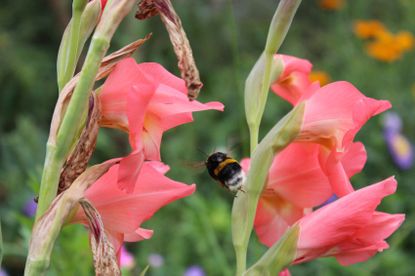

Deadheading gladiolus ensures continued beauty. However, there are several schools of thought on whether it is a beneficial activity for the plant or simply soothes the neurotic gardener. Do you need to deadhead glads? That depends on what you mean by “need.” Learn how to deadhead a gladiolus and why you might want to do it here.
Do You Need to Deadhead Glads?
Gladioli are queens of the landscape when they are in bloom. The majestic spires bear numerous flowers arrayed up the stalk, in hues that defy imagination. Gladiolus flowers last about a week but sometimes persist on the stalk for up to two weeks. They bloom consecutively with the lower buds opening first and the upper ones finishing several days later. Some gardeners feel that you must deadhead gladiolus flowers in order to force more blooms. Generally, a bulb produces one but sometimes up to three stems with flowers. The bulb only has so much energy stored in it but if it is a big, healthy bulb, it has the ability to produce more blooms. However, the bulb is where the plant gets the energy to make the sword-like leaves and spires of flowers. The roots of the plant uptake nutrients and water for healthy growth but the embryos are inside the bulb and dictate the formation of flowers. Pinching off a dead flower is not going to affect this ability in any way. Gladiolus flower removal is more of a panacea to the gardener who feels they need to be doing something for their plant as a reward for brightening the summer landscape.
When Gladiolus Flower Removal is Beneficial
Gladiolus flowers open sequentially, starting at the bottom of the bloom stalk. By the time the top flowers are open, the bottom flowers are usually gray or brown, dead, and fully spent. This mars the overall beauty of the stem, so the impulse is to remove the dead flowers for aesthetic reasons. This is fine but there is also a reason to remove the top buds before they even open. If you pinch off the top one or two buds on the stalk, the entire stem will bloom in unison. The action forces the energy back down into the stem which unites a more unified bloom.
How to Deadhead a Gladiolus
Deadheading gladiolus flowers is not really necessary, but it causes no harm to the plant and ensures a prettier display. The notion that if you deadhead gladiolus, you will get more blooms-- is not accurate. Removing old flowers as the stalk blooms is simply a housekeeping exercise. It is easy to accomplish by pinching out the old flower or using garden shears to carefully cut the swollen base from the stem. Once all the flowers have faded, remove the entire stem with pruners or shears. Always leave the foliage until it has begun to die so that it can gather solar energy for the bulb to store and use in the next season. The plant turns the sun into carbohydrates that it uses to fuel the next summer's bloom.
Gardening tips, videos, info and more delivered right to your inbox!
Sign up for the Gardening Know How newsletter today and receive a free download of our DIY eBook "Bring Your Garden Indoors: 13 DIY Projects For Fall And Winter".

Bonnie Grant is a professional landscaper with a Certification in Urban Gardening. She has been gardening and writing for 15 years. A former professional chef, she has a passion for edible landscaping.
-
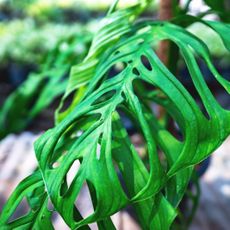 Monstera Esqueleto Care Guide
Monstera Esqueleto Care GuideMonstera esqueleto is a high-drama houseplant with natural holes in its leaves. It loves to climb and enhance your living space with its big evergreen presence.
By Susan Albert
-
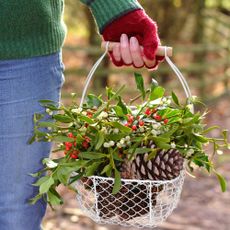 6 Last-Minute Holiday Decorations You Can Make Using Garden Greenery
6 Last-Minute Holiday Decorations You Can Make Using Garden GreeneryCreate a beautifully festive interior with these foraged foliage decor ideas that will add holiday magic with just a few minutes' work.
By Melanie Griffiths
-
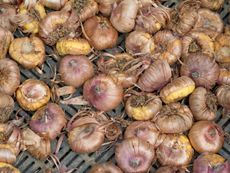 Gladiolus Plants With Scab – Controlling Gladiolus Scab On Corms
Gladiolus Plants With Scab – Controlling Gladiolus Scab On CormsIf you are growing gladioli, you’ll want to know about gladiolus scab. For more information and tips on prevention and control, click here.
By Teo Spengler
-
Gladioli Mosaic Virus – Managing Symptoms Of Gladiolus Mosaic
Gladiolus blooms are featured in many cutting gardens for mid-summer bouquets. When issues like mosaic occur, this can naturally be alarming. Good cultural control can help prevent mosaic virus in gladiolus. Learn more in this article.
By Susan Albert
-
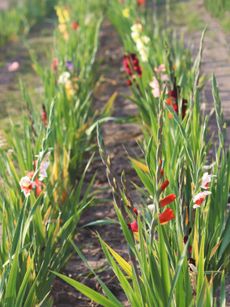 Botrytis On Gladiolus Plants: How To Control Gladiolus Botrytis Blight
Botrytis On Gladiolus Plants: How To Control Gladiolus Botrytis BlightGladiolus botrytis diseases are not uncommon, so knowing the signs and how to manage them is important. Learn about gladiolus blight here.
By Mary Ellen Ellis
-
Treating Glads With Fusarium: How To Control Gladiolus Fusarium Rot
If the corms of your unplanted glads appear discolored and unhealthy, they may be infected with gladiolus fusarium rot. Learn more about fusarium wilt and rot on gladiolus plants in this article to see if your corms can be saved.
By Becca Badgett
-
Gladiolus Leaf Diseases: What Causes Leaf Spots On Gladiolus Plants
When kept healthy and disease free, gladiolus plants will return year after year. Issues like gladiolus leaf spot, however, may cause decline of your plants. Becoming familiar with the signs of gladiolus leaf diseases is important in preventing spread. Learn more here.
By Tonya Barnett
-
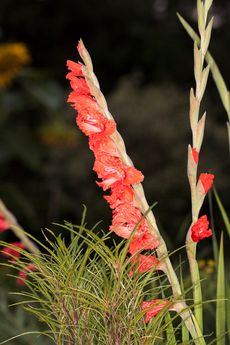 Is Your Gladiolus Falling Over – How To Stake Glads In The Garden
Is Your Gladiolus Falling Over – How To Stake Glads In The GardenGrowing glads is so simple, but sometimes the tall gladiolus falling over in the garden can be troublesome, if not unattractive. Luckily, with a little added support, this can be easily remedied. Click this article for additional information.
By Mary H. Dyer
-
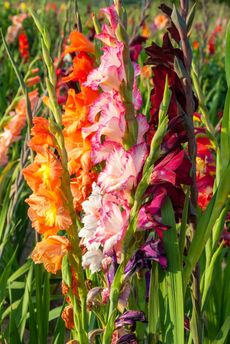 Gladiolus Are Falling Over – Learn About Staking Gladiolus Plants
Gladiolus Are Falling Over – Learn About Staking Gladiolus PlantsProlific bloomers they are, but gladiolus plants falling over is not uncommon. Staking gladiolus plants will keep their brightly colored heads from dipping or breaking, and there are any number of items that can be used as gladiolus plant stakes. Learn more here.
By Amy Grant
-
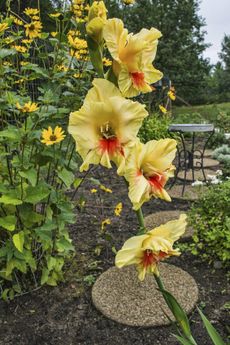 Companion Planting With Gladiolus: Plants That Grow Well With Gladiolus
Companion Planting With Gladiolus: Plants That Grow Well With GladiolusAs well as bouquets, gladiolus looks amazing in flower beds and along garden borders. But what are some good companion plants for gladiolus? Click this article to learn more about plants that grow well with gladiolus.
By Liz Baessler